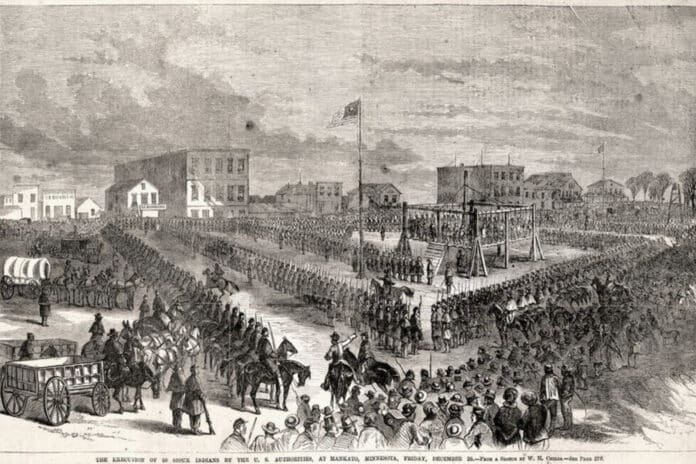
In a Dec. 26 social media post on X, Minnesota Gov. Tim Walz, a Democrat, remembered and seemed to honor Dakota murderers and rapists.
“161 years ago, 38 Dakota men were hung. Today, the Dakota 38+2 runners ran 71-miles overnight from Fort Snelling to Mankato in remembrance of the largest mass execution in U.S. history,” said Gov. Walz. “Their sacrifice reminds us all to continue our commitment to accountability and healing.”
The Dakota 38 was a group of men from the Native American Dakota tribe who were found guilty by a military commission and President Abraham Lincoln of “individual murders and atrocious abuse of their female captives” during the U.S.-Dakota War of 1862, according to the Center of the American Experiment. All 38 Dakota men were sentenced to death.
Gov. Walz’s mention of a 71-mile trek refers to an annual memorial run which seeks to “honor” the Dakota 38.
The U.S.-Dakota War began on Aug. 17, 1862 when four Dakota men murdered five white pioneers, including a 15-year-old girl, in Acton, Minn. After this occurred, the Dakota decided to declare war against the pioneers. Dakota tribesmen proceeded to attack pioneer farms and communities across multiple Minnesota counties. More than 200 pioneers were killed in these attacks. Additionally, over 200 pioneer women and children were taken captive by the Dakota.
In response to these massacres perpetrated by the Dakota, Minnesota Gov. Alexander Ramsey designated Henry H. Sibley, a former Minnesota governor, to organize and lead a militia against the Dakota.
Over the ensuing weeks, a series of battles occurred between Sibley’s militia and the Dakota. These skirmishes and attacks occurred in or near Hutchinson, Acton, Forest City, Fort Abercrombie, Lake Shetek, and Wood Lake. Both New Ulm and Fort Ridgely were attacked twice by the Dakota during this time.
On Sept. 26, 1862, the Dakota surrendered and the United States was victorious.
According to historian Curtis Dahlin, over 650 white pioneers were killed during the U.S. Dakota War, 100 of whom were children. Conversely, “only 100 Dakota warriors were killed and none of them were women or children.”
In his Tuesday remembrance, Gov. Walz made no reference to the hundreds of pioneer fathers, mothers, and children who were butchered by the Dakota.
When the war was over, a military commission sentenced 303 Dakota men to death for their actions during the war. However, President Lincoln stipulated that “no executions be made without his sanction,” the Center of the American Experiment’s John Phelan explained in an article.
According to author Scott W. Berg, over the course of several weeks, President Lincoln and members of his administration reviewed the convictions “to scour the trial transcripts with great care and identify all cases of rape, all cases involving the murder of women and children, and all cases involving the killing of unarmed men in the settlements. These sentences, in Lincoln’s estimation, accorded with the purpose of a military commission and deserved speedy executions.”
President Lincoln commuted the sentences of all but 38 individuals. His review concluded that the remaining 38 Dakota men sentenced to death were “guilty of individual murders and atrocious abuse of their female captives.”
On Dec. 26, 1862, 38 Dakota men were executed by hanging in Mankato, Minn. Captain William J. Duley served as the executioner. Captain Duley was the “father of three children who had been murdered at Lake Shetek,” Phelan’s article says.
However, one of the 38 put to death was executed in error when he was mistaken for a different Dakota man who “killed and mutilated a pregnant woman,” according to Phelan. The Minnesota Historical Society asserts that a total of two of the men were mistakenly hanged.
















